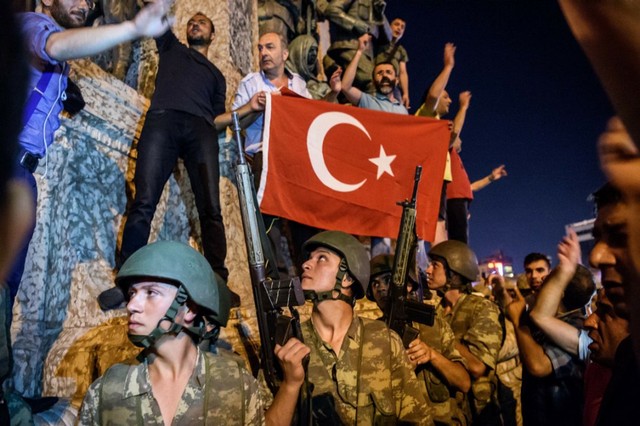By Dr Binoy Kampmark
Any doubts that Turkey’s involvement in the conflict against Islamic State is purely symbolic were dispelled by a latest round of air strikes against Kurdish positions in northeast Syria and Iraq’s Sinjar region, killing at least 20 fighters. (The number from Ankara is a more inflated 70). Iraqi government officials were flawed by the action, infuriated by its audacity; the US State Department was troubled and confused.
“We are very concerned, deeply concerned,” claimed spokesman Mark Toner, “that Turkey conducted air strikes earlier today in northern Syria as well as northern Iraq without proper coordination with the United States or the broader global coalition to defeat IS.”[1] Toner also explained that such strikes “were not approved by the coalition and led to the unfortunate loss of life of our partner forces in the fight against” Islamic State.
The Pentagon seemed less troubled, concerned more with logistical error and plain bungling among coalition members. “We don’t want our partners hitting other partners,” came a statement from a senior US defence official. “We’ve got to figure out exactly who got hit. We don’t know yet. We do know where the strikes were, but we don’t know exactly who is dead.”[2]
Turkish President Recep Tayyip Erdoğan is very much on top of the world – his world, at least. On the home front, he continues a savage campaign against alleged coup plotters through mass detentions. He is beaming from the referendum results held this month that granted him new constitutional powers.
Refuting the suggestion that this latest round of belligerence was an act of introspective, isolated adventurism, he explained that, “We shared this with the US and Russia and we are sharing it with Iraq as well. It is an operation that (Iraqi Kurdistan President Massoud) Barzani has been informed about.” Such an interpretation stretches the meaning of sharing, to say the least.
A statement from the Turkish military justified the strikes on a long grounded and orthodox basis: that the groups in question had links with the Kurdish Workers’ Party, or PKK, deemed by both Washington and Ankara as a terrorist group. The fighters in question had become targets as a preventative measure against the smuggling of weapons and munitions into Turkey that might end up being used by the PKK against the Turkish state. The agenda for liberation has no borders:
“To destroy these terror hubs which threaten the security, unity and integrity of our country and our nation and as part of our rights based on international law, air strikes have been carried out… and terrorist targets have been struck with success.”
The PKK presence in Sinjar was yet another consequence of violence and its bitter fruit, a response to the murderous efforts of Islamic State militants against the local Yazidi population that saw genocide and enslavement practiced against thousands. Erdoğan is less sentimental about the reaction to IS exploits, concerned that the PKK presence risks creating a “new Qandil” reminiscent of the organisation’s base bordering Turkey, Iraq and Iran.
The bloody melange looks all the more complicated for having the US-backed Popular Protection Units (YPG), being targeted by a NATO and US ally, a point that underscores Turkey’s ambivalent role in fighting various fundamentalist groups in the conflict. Turkey is keeping its enemies traditional.
The YPG was in little doubt what the actions had done, expressing its anger in a Twitter post. “By this attack, Turkey is trying to undermine [the] Raqqa operation, give (IS) time to reorganize and put in danger live of thousands of” displaced persons.
For some months now, Ankara has been insisting that Washington adopt a different approach to their YPG allies, one of studied disentanglement from the Kurdish temptation. Preference, at least from the Turkish side of things, is given to closer cooperation with Syrian units, notably in efforts to remove Islamic State forces from Raqqa.
An even more stern tone has been directed at Baghdad, accused of dragging its feet on the issue of dealing with the Kurdish problem. A statement by spokesman Saad al-Hadithi ventured a condemnation, claiming that the raids were “a violation of international law and of Iraqi sovereignty.” Much of this will fall on deaf ears, given the porous, contingent nature of the current Iraqi and Syrian borders. Large powers trample and stomp, and the governments in question seem mere caretakers for the next hostile engagement.
The Ministry of Peshmerga Affairs in the Kurdish north had little time to lavish legitimacy on the Turkish assault, but it had a concession to make: “PKK has been problematic for the people of the Kurdistan region and, despite broad calls to withdraw, refuses to leave Sinjar.”[3]
Accordingly, the “PKK must stop destabilising and escalating tensions in the area to allow life to return to the people of the area.” A frightful mess and one that Erdoğan has every intention of complicating.
Dr. Binoy Kampmark was a Commonwealth Scholar at Selwyn College, Cambridge. He lectures at RMIT University, Melbourne. Email: bkampmark@gmail.com
[1] http://www.bbc.com/news/world-middle-east-39708909
[2] http://www.middleeasteye.net/news/turkey-bombs-kurdish-forces-northeast-syria-179841213
28 April 2017

